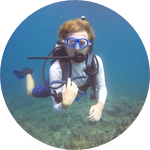About This Project
Our project aims to understand how coccolithophore responses to ocean acidification (OA) change nanoplankton community structures. We hypothesize that coccolithophore responses to OA will negatively affect nanoplankton community structures. Through a combination of lab and field work, we will observe these phytoplankton in their natural environments. This study will advance our knowledge of how calcareous phytoplankton and plankton communities will behave in future acidic oceans.
Ask the Scientists
Join The DiscussionWhat is the context of this research?
Ocean acidification is an ecological phenomenon responsible for the declining health of many marine ecosystems, starting with the plankton community. One of these micro-organisms, coccolithophores, creates its exoskeleton out of calcium carbonate, and may serve as an indicator for the greater ecosystems response to ocean acidification. Past research have documented their responses to rising CO2 levels, but discrepancies between papers have led to conflicting results. This project aims to understand how coccolithophore responses to ocean acidification changes plankton community structures.
What is the significance of this project?
Coccolithophores are a vital part of the carbon oceanic circulation pumps as they construct their exoskeletons from carbon molecules, which also serve as ballast for sinking organic material and diminish surface carbon molecules available for acidification reactions. But rising CO2 levels may diminish coccolithophores ability to build coccospheres, jeopardizing the health of phytoplankton and the overall marine ecosystem. If coccolithophores can adapt to the changing environment and algal community structures, then coccolithophores could continually transport carbon molecules down the water column. In some cases, this CO2 absorption could even slightly mitigate ocean acidification impacts on local marine environments.
What are the goals of the project?
The goal of this project is to assess the carbon sequestration ability of coccolithophores through a combination of lab, field, and analytic research. At Juniata College, we will compare differences in field and lab studies through a meta-analysis of past acidification research relating to Emiliania huxleyi, the most common coccolithophore species. We will also run algal raceway cultures to observe community changes based on rising CO2 levels. At the ZMT, we will measure CO2 levels in mesocosm cultures with Emiliania huxleyi and plankton communities to compare the success of inorganic carbon transportation. This project will ideally provide a supported view of coccolithophore responses to ocean acidification, and project the future for the marine planktonic community.
Budget
This budget outlines the materials required to conduct the ZMT portion of this project. Traveling to Bremen includes flights and in-country travel expenses for researchers. The many chemical components are necessary in mimicking natural marine conditions, while also allowing control and manipulation over aspects of the marine chemical conditions. The price for a batch of a common coccolithophore species, Emiliania huxleyi, comes from Utex.org. CO2 tanks and other mesocosm parameters were not included in this budget as they may be available at ZMT. Other costs, such as field work, researcher stipends, and living costs, will be covered by other sources of funding.
Endorsed by
 Project Timeline
Project Timeline
By the end of 2019, we hope to complete the meta-analysis and community structure observations on our in-lab algal raceways. We may also be conducting SEM or genetic analysis on our plankton communities.
By May 2020, we hope to complete research at the Leibniz Centre for Tropical Marine Research and assemble data from previous studies, lab work, and mesocosm research to present a complete study on coccolithophore calcification and nanoplankton structure adaptations to ocean acidification.
Oct 25, 2019
Project Launched
Nov 30, 2019
Finish lab research at Juniata College
Jun 01, 2020
Travel to Leibniz Centre for Tropical Marine Research
Aug 20, 2020
Complete study at Leibniz Centre for Tropical Marine Ecology
Aug 31, 2020
Host educational presentations/discussions on our findings for local and online communities
Meet the Team
Evan Quinter
I am a recent graduate of Juniata College with a degree in Environmental Science and Marine Biology. I previously studied coral husbandry, brown trout behavior, and cephalopod color vision, and hope to pursue a career in marine research focused on reef ecology and marine environmental conservation.
Sonia Bejarano
I am a marine ecologist dedicated to understanding what makes coral reefs robust and stable or susceptible to increasing levels of environmental stress, human use, and climatic uncertainty. Currently working as the head of the Reef Systems Research Group at the Leibniz Centre for Tropical Marine Research, I have worked on an international scale to understand humans impact on ecosystems, and how we can learn to become better stewards of our environment.
Neil Pelkey
I am an ecologist working on endolithic bacteria in snail shells, the genomics of freshwater and marine biofilms, and potential biological controls for toxic cyanobacteria.
Additional Information
We would also like to introduce Donor Rewards for donations above certain levels. The various prizes are listed below, with their associated price range. Prizes will be created and shipped from Huntingdon, PA, USA.
Donor Levels:
$25 = An SEM photo postcard of a coccolithophore found In our algal raceway communities
$50 = An SEM photo poster of a coccolithophore, with a personalized message signed on the back
$75 = A small necklace with a coccolithophore pendant
$100 = A 3D printed coccolithophore desk weight
More information on the project, as well as the donor reward prizes, will be updated in upcoming lab note postings.
My contact information is quinterevan@gmail.com, please feel free to contact me with any questions or inquiries.
Project Backers
- 27Backers
- 132%Funded
- $2,522Total Donations
- $93.41Average Donation



